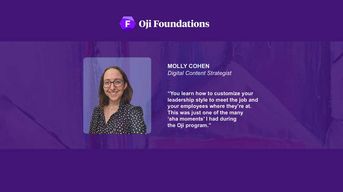First Impressions of the Oji Foundations Program

In a world of remote and hybrid work, community is more important than ever. I’m currently enrolled in a leadership program through Oji Life Lab, which has given me a built-in community of peers. I wanted to share my experience in the event that my story will be helpful to others.
I'm nearing the end of the Oji Foundations program, and what’s struck me is that my perspective is already changing. As a first-time manager with two direct reports, I took the course to improve my leadership skills going into my second year of management. I work in digital publishing/media, and specifically wanted to get better at leading teams more effectively and at navigating feedback conversations. I was drawn to Oji because the program incorporates tips from trusted, successful leaders including Linda Hill and Marc Brackett.
Despite being in the program to learn, I’ve realized I’m teaching my peers as well. By being in an Oji cohort, we are empowering each other – we’ve been able to pull out and identify the natural talents and individual strategies that we each bring to the table, sometimes unknowingly. This has given us new strategies to implement in our jobs.
One of my favorite things about the Oji program is that the way it’s designed forces you to be present. Our live sessions with an Oji Coach incorporate role play activities that purposefully put us on the spot, challenging us to act out how we’d handle everyday scenarios we face as managers. Meanwhile, our internal team meetings give us a safe space to ask deeper questions. These meetings have been the most valuable for me, followed by the hands-on activities in the Oji app. It’s great that there are so many different approaches to reinforce the learning – some learners may resonate more with the app’s short-form videos and audio clips with leadership tips, while others like myself may gain the most from hands-on activities.
Diving into the program
The program began with meeting my cohort in the first live Team Session. I was really excited to find that my peers were all from different industries and at different stages in their careers. I could already tell that I had to lot to learn from them. After meeting as a group, it was time to catch up on the self-paced lessons in the Oji mobile app. Working my way through Level 1, I completed a reflection activity noting what I hoped to achieve from the program and filled out a Values Checklist identifying my core values as a leader.
Working in the publishing industry, my top values are creativity, learning, openness, and independence. The big takeaway I had was that sometimes our core values can come into conflict with our work as a manager. For example, a budgetary constraint may limit the level of creativity you can have on a project you’re leading, or a direct report may not perform well if given too much independence. In fact, employees may need regular check-ins to feel motivated to get work done on deadline, whereas I might prefer to be managed with a more hands-off approach. No matter what your core values are, the bottom line is that as a manager, it’s up to you to customize your leadership style to meet the job and your employees where they’re at. This was just one of the many "aha moments" I had during the Oji program.
The course explores 7 key focus areas – the first two being Leadership and Management. While these are often lumped together, leadership and management are two separate skills that managers need to possess to transition from good to great. Meeting as a cohort, we were able to identify each of our leadership styles and how we wanted to grow. One member identified as a facilitator, and wanted to grow by inspiring employees more. Another identified as a cheerleader for their team and wanted to grow by listening better. As for myself, I identified as a project-focused, big-picture strategic thinker, and realized I wanted to grow by spending more time building connections with my team before diving right into the work to generate an increased sense of trust and belonging earlier on. This discussion on leadership styles led to a deeper conversation on strategies.
Some of the questions we discussed as a team were:
- How do you facilitate team conversations?
- What does listening look like to you?
- How do we each create a sense of belonging and trust as a manager?
- How do we motivate and inspire employees?
- What strategies are we each currently using to do these things?
- What new strategies could we try implementing?
The impact
It was incredibly helpful to hear from my team what strategies they were using on the job, and fascinating to learn how leadership looks different in each of our industries. Having a trusted peer network to discuss these topics with was invaluable. Through the Oji course, I’ve gained a safe space to discuss everything from leadership mistakes to leadership wins without fear of judgment. Because we all work on different teams, there’s another level of openness I’m able to have in my cohort. We’ve even discussed what it felt like being dropped into the deep end when we first became people managers. It’s in these team meetings that we go off on tangents that lead to aha moments of learning. As a female leader, a standout conversation to me was our discussion on how to celebrate our wins as women and why we struggle with this at times.
Zooming out, another big focus area of the Oji program is Emotional Intelligence. We were introduced to the Mood Meter, a visual tool that features four quadrants to classify your energy level on any given day. The idea being that by tracking your mood over time, you can better learn what you need to self-regulate and become a more balanced leader. For example, one of the managers in my cohort shared that they were able to transition from being in the red zone (high energy, unpleasant) into the green zone (low energy, pleasant) by setting aside additional time in their day to process what they were feeling. I think the big takeaway here is that being a manager is complex; as humans, we feel hundreds of emotions every day, and as managers, we’re carrying the additional challenge of managing our team who has their own unique set of emotions. As managers, we may fluctuate between different quadrants on the mood meter throughout the day as our task load changes in our work and our personal lives.
For myself, one of the Oji tools that has had the biggest impact on my leadership is the Try Prep-Do-Review activity. The lesson asks you to identify your “why” to prep for what you have to do as a manager and then upon completion, reflect on whether you were successful. This seemingly simple tool had a ripple effect. I had a few difficult conversations I had to lead as a manager at work coming up and used this activity to prepare. I found that by identifying that my why was to improve team productivity, it became easier for me to have the conversation.
While feedback conversations are never easy, I realized that I was coming from a good place, and that gave me a renewed sense of confidence and comfort that the difficult conversation was worth the effort. I also found that I was able to be more relaxed – leading a difficult conversation from a place of comfort allows your employee to feel more comfortable too, which often leads to a more productive conversation. I find that as a manager, whatever you project is mirrored by your team. If you’re nervous, your team will pick up on it and be nervous too, whereas if you’re comfortable, your team will feel safe to feel the same. By using this Oji tool, I was able to create a greater sense of comfort on my team, which is an invaluable thing for any manager. Now that I have this practice in my toolkit, I can refer back to it at any time.
There have been numerous moments of personal growth and lessons learned over the course of the Oji Foundations program, and I can’t wait to dive into the next live session in April.
Latest Posts
BACK TO HOME ❯Sign up for our People-Powered Newsletter.

 Meet our Program Experts
Meet our Program Experts
 Why Oji is Different
Why Oji is Different
 A masterclass in destroying a remarkable culture
A masterclass in destroying a remarkable culture